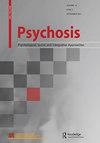Effects of mindfulness on psychotic symptoms: insights from a randomized clinical trial
IF 1
4区 医学
Q4 PSYCHIATRY
Psychosis-Psychological Social and Integrative Approaches
Pub Date : 2021-07-01
DOI:10.1080/17522439.2021.1889649
引用次数: 4
Abstract
ABSTRACT Background Mindfulness has been found to be a helpful approach for some peole who experience psychosis. Methods We used data from a prior exploratory clinical trial, to compare the effects on psychotic symptoms of six months of standard psychiatric rehabilitation versus six months of standard psychiatric rehabilitation combined with weekly mindfulness sessions. 52 patients from a community rehabilitation center were randomly allocated to Integrated Rehabilitation Treatment (IRT) or IRT enhanced with Mindfulness Based Interventions (IRT+MBI). Measures comprised a clinical record form and the PANSS interview scored according to the five-factor model of Wallwork. Raters were blinded to treatment allocation. Results Both groups reduced their scores in the Depression factor (IRT+MBI: F = 5.29, p = .026, Ƞ 2 = .096, IRT: F = 4.51, p = .039, Ƞ 2 = .083), IRT+MBI also reduced their scores in the Negative (F = 32.21, p < .001, Ƞ 2 = .392) and Excited (F = 4.87, p = .032, Ƞ 2 = .089) factors. Simple effect analysis at post-treatment showed significant differences in the Negative factor in favor of IRT+MBI (F = 4.67, p = .035, Ƞ 2 = .085). Discussion Mindfulness did not increase the frequency of positive symptoms but it did reduce negative symptoms. The lack of an effective treatment for negative psychotic symptoms underscores the clinical importance of the findings.正念对精神病症状的影响:来自随机临床试验的见解
研究发现,正念对一些精神病患者来说是一种很有帮助的方法。方法:我们使用先前探索性临床试验的数据,比较六个月标准精神康复与六个月标准精神康复结合每周正念课程对精神病症状的影响。来自社区康复中心的52名患者被随机分配到综合康复治疗(IRT)或正念干预增强的IRT (IRT+MBI)。措施包括临床记录表和根据Wallwork五因素模型评分的PANSS访谈。评分者对治疗分配不知情。结果两组患者在抑郁因子(IRT+MBI: F = 5.29, p = 0.026, Ƞ 2 = 0.096, IRT: F = 4.51, p = 0.039, Ƞ 2 = 0.083)得分均有所降低,在消极因子(F = 32.21, p < 0.001, Ƞ 2 = 0.392)和兴奋因子(F = 4.87, p = 0.032, Ƞ 2 = 0.089)得分均有所降低。治疗后的简单效应分析显示,阴性因子有利于IRT+MBI (F = 4.67, p = 0.035, Ƞ 2 = 0.085)。正念并没有增加阳性症状的频率,但它确实减少了阴性症状。缺乏对阴性精神病症状的有效治疗强调了该发现的临床重要性。
本文章由计算机程序翻译,如有差异,请以英文原文为准。
求助全文
约1分钟内获得全文
求助全文
来源期刊
CiteScore
2.20
自引率
8.30%
发文量
36

 求助内容:
求助内容: 应助结果提醒方式:
应助结果提醒方式:


